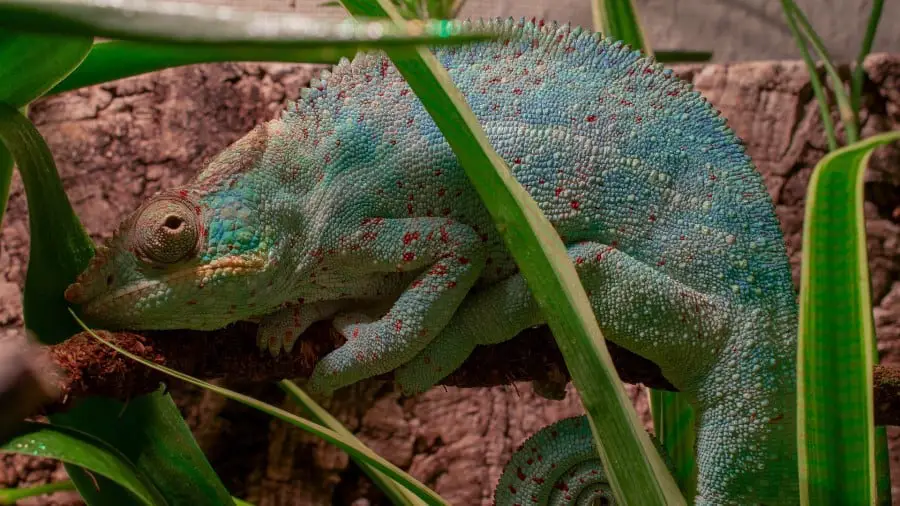
Stress is very prominent to chameleons but is it possible for them to die from it? Pet owners from all around the world know that chameleons aren’t the best handlers of stress in the animal kingdom. Since they are so susceptible to it, can chameleons die from stress?
Chameleons can die from stress but it doesn’t kill them directly. Instead, it causes the chameleons many problems that will eventually lead them to death. Knowing the signs can help you to monitor your chameleon’s stress levels for a better quality of life.
Stress is very deadly to chameleons. This is why chameleon owners are often encouraged to not stress their chameleons out. The inability to monitor their stress will unintentionally shorten their lifespan. Why can stress cause chameleons to die?
How Does Stress Cause Chameleons To Die?
Stress affects living things in many ways. It can alter them mentally and physically. This is why we should try and avoid causing stress to our chameleons. Long-term exposure to stress will eventually kill them.
Here a few ways of how stress can affect a chameleon.
Compromised Immune Systems
Long-term exposure to stress will compromise their immune system. It doesn’t immediately kill them but having a compromised immune system for a long period of time does.
A compromised immune system will open chameleons up to diseases causing them to be sick more easily. Since the body will then have to regulate itself for stress and fight off diseases, it will tire out the body and eventually shut down.
Loss Of Appetite
Stress will also make them stop eating. This is either due to fear or the body shutting itself down. The body will eventually wither out without the sustenance of food. Hence, loss of appetite is also one of the signs to identify a chameleon’s stress.
Cardiovascular Problems
Stress causes the heart to beat faster. These palpitations will raise the blood pressure in the blood vessels that carry blood throughout the body.
Prolonged high blood pressure will stress out the heart and cause it to work harder. This causes the heart to age faster which will lead to problems down the road.
What Causes Stress In Chameleons?
Chameleons are very sensitive creatures that are considered quite hard to take care of as many things can stress them out. Here are 3 general reasons for chameleons to be stressed.
Company (And How Overhandling Affects Them)
Chameleons are very shy and solitary animals. They don’t like the company of others and prefer to be left alone for their entire lives. Don’t think they just hate you though, they don’t even like the company of other chameleons.
This is because reptiles are unable to form social bonds with others. They can’t even form social bonds with their own offspring. They think that every living thing around them is out to get them.
Everyone is an enemy in their mind. Being in the company of others stresses them out greatly, so it should be avoided at all costs. Don’t even get me started with handling them.
Their natural instincts will think of your hand as an eagle claw trying to grab them. Don’t treat them as you would a dog or cat.
Sickness
Though stress can cause illness to happen, it works the other way around too. Being sick will cause them pain which stresses them out.
This is because their only choice to illness is just to wait it out painfully and hope that it subsides. Chameleons don’t have access to medicine or doctors.
This is why it is important to bring your chameleon to a vet so that they can recover quickly.
Environment
The environment they live in will also heavily affect their stress levels. If they are uncomfortable with their environment, they will get more stressed.
Things such as ambient temperature, foliage, and even enclosure material will heavily influence their stress levels.
Since they’ll be living there for most of their lives, it is important that you create an environment comfortable enough for them so that they don’t get stressed out.
Pregnancy & Mating
Pregnant chameleons will also show signs of stress. This is normal and will pass as long as they are allowed to lay their eggs. The same goes for male chameleons who are seeking a mate. There is no need to worry unless the stress signs prolong after.
What Are The Signs Of A Chameleon Under Stress?
Your chameleon can’t tell you when they are stressed, but they will show signs of it as a way of communication. Be sensitive to what they are trying to convey so that you don’t act too late. Here are a few signs that your chameleon is under stress.
The Chameleon Salute – This is usually one of the first signs of stress. They will keep their front legs close to them while also leaning away from you. There is also a double salute where they raise both front legs instead.
Puffing Gular – The gular is a pouch of skin located in the throat or chin area. When stressed, they will try to make themselves appear larger by enlarging the gular. This is an attempt to scare off other creatures.
Body Flattening – Other than puffing up, there is also another method they use in response to threats. They will also try to make themselves as small as possible so that they can avoid vision. Chameleons do this by flattening out their bodies.
Gaping – When something approaches the chameleon, like your hand, for instance, it might gape as a response to stress. This is to trick their enemies into thinking that they are about to bite them.
Hissing – This is a natural instinct that most animals have. They use this as a way to scare off their opponents and chameleons are no different. This is usually accompanied by the puffing or body flattening or gaping mentioned earlier.
Color Changing – One of the ways chameleons can communicate with humans is using their colors. When stressed or threatened, they will turn brighter or darker in response to it. It’s ironic how the things we see as so beautiful is actually their way of showing fear.
Running Away – The easiest way to know if a chameleon is stressed is if they start to run away. This is a natural instinct that most living things have in response to stress.
Sunken Or Closed Eyes – When a chameleon is stressed, you might notice that their eyes are either sunken in or closed. These are warning signs that you have made them very uncomfortable and are starting to shut themselves down.
Biting – Of course, the very last thing they will do when stressed is biting. This is the last resort that rarely ever happens even in the most extreme situations. They will bite very slowly and obviously, so you can always avoid letting them bite you. Knowing the signs can help you to respond better to your chameleon.
How Long Does Stress Take to Kill Chameleons?
It is hard to determine how long it will take stress to kill chameleons. This is because they don’t die directly from stress but from the complications stated above caused it.
When chameleons are stressed, it can take them weeks or even months to die from being stressed depending on the stress level.
If they are just a little stressed, it might take months before they die from it if the problem isn’t fixed. On the other hand, if it’s severe stress, it can take just weeks.
How Can I Avoid Stressing Out My Chameleon?
Prevention is better than cure, it is crucial that you avoid stressing your chameleon out as much as you can.
Here are a few things you should be aware of to prevent stressing out your chameleon.
Get A Suitable Enclosure
The first thing you should look at if you suspect that your chameleon is stressed is by looking at its enclosure.
Ensure that they are living in an optimal environment that is comfortable enough. The best kind of enclosure is one that closely resembles that natural habitat.
Plants & Branches – Not only do they resemble the trees that they climb in the wild, but plants can also provide them with hydration and hiding spots if they feel threatened. Not only that but if they wanted to, they could eat the leaves as well for various reasons.
Lighting – You should also have the optimal lighting set up so that it doesn’t cook your chameleon alive in the enclosure. Use only lightbulbs between 25 W-100 W as these outputs are just enough to create the best temperature for them. Place the bulbs opposite of each other to create radiant heat in the cage.
Use The Proper Cage – Avoid using glass cages that reflect them. This will make them think that another chameleon is in their cage threatening their territory. Chameleons aren’t smart enough to differentiate a reflection from a real chameleon so avoid it if possible.
In most circumstances, captive chameleons should be kept in screen cages. However, there are exceptions where glass cages should be used instead.
If you are interested to learn more about why are chameleons kept in screen cages, just click the link and you can read all about it.
Never Put More Than One Chameleon In A Cage
Some people think it’s cute to put more than one chameleon in the same cage. They do this because they think they can get along and be friends. In truth, chameleons absolutely hate having company.
They love it when they know that the territory is all for themselves. Placing two chameleons in the same cage will only stress both chameleons out and kill one of them quicker.
This is because they will fight for domination and the losing chameleon will usually stop eating or hunting.
Handle Less (Or Not At All)
As previously explained, chameleons don’t like the company of others. A dog or cat may like it when you pet them but chameleons don’t share the same feelings.
They would rather you just leave them alone for their entire lives. Handling them will only stress them out more and cause them an inevitable death. If you insist on handling them, do it in moderation.
Try to first make them used to your presence first by hand feeding them enough so that they can recognize your hand. Don’t expect them to form a bond with you though, they aren’t exactly friendly.
Move Slower
Chameleons are very easily scared by everything. Sudden and jerky movements will threaten them and scare them. They will assume that you are out to get them so they respond in fear.
Try to move slowly whenever you are around your chameleon. This is especially true if you are going to feed or handle it. Make your presence known to them by letting them see you before you do anything else.
Veterinary Help
If you suspect that your chameleon is sick or injured, bring it to a reptile specialist right away. Hesitating will only prolong their stress and increase their risk of succumbing to their injuries.
Chameleons will rarely recover fully without external help so your actions do matter here.
Conclusion
Stress impacts a chameleon immensely. Long-term exposure to stress will cause complications that will lead to their untimely demise.
Knowing what causes them to get stressed out and the signs of them being stress will help you to realize what should be done.
Avoid stressing them out as much as you can to make them feel safe and happy.


